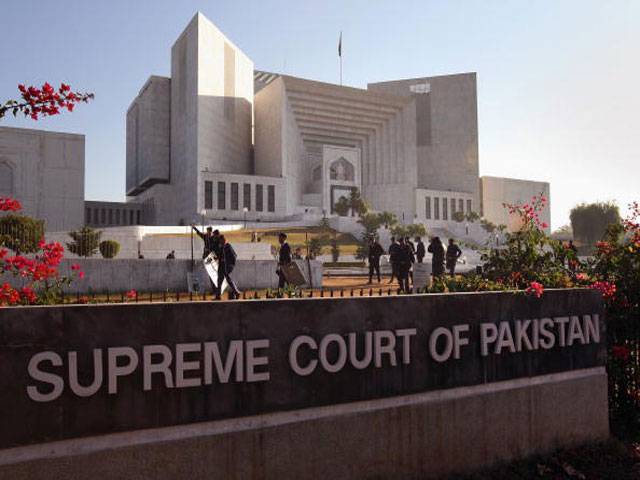ISLAMABAD - The Supreme Court on Thursday questioned how former president Pervez Musharraf in his capacity as Chief of Army Staff or even as president acted on his own (discretion) as he had no power under Article 48 of the Constitution to impose emergency and make judges of the Supreme Court and High Courts dysfunctional.
In its detailed judgement rejecting Pervez Musharraf’s review petition filed against apex court’s July 31, 2009 decision, the Supreme Court observed that Musharraf’s counsel, Ibrahim Satti, who represented him in the review petition, admitted that the then prime minister Shaukat Aziz had written a letter to the president of Pakistan and not to the Chief of Army Staff. Furthermore, the prime minister had not advised him to impose emergency rather “the petitioner (Musharraf) acted in his own discretion,” read the judgement, adding that it further weakened the case for review.
A 14-member bench of the apex court has already dismissed former army chief’s applications in a short order, passed on the 30th January.
Chief Justice Tassaduq Hussain Jilani authored the 42-page detailed judgment, while Justice Jawwad S Khawaja, a member of the bench that heard the case, wrote an additional note.
The order read: “The judgment under review (31st July) does not stand vitiated by any bias or error in law or fact.”
The detailed judgment also says that the 31st July judgment does not reflect any personal bias of former Chief Justice Iftikhar Muhammad Chaudhry against Pervez Musharraf.
Giving a comprehensive overview of martial laws and military interventions in the democratic system in the country, the detailed order read: “The spirit which underpins this judgment is a strong realisation that we should not remain trapped by mistakes in history and turn a new leaf towards constitutionalism and the rule of law.”
Musharraf’s plea questioning retrospective effect to Article 6 was also dismissed. The order ruled neither the question of petitioner’s trial nor the retrospective or prospective effect of Article 6 were moot points in the 31st July judgment, therefore this argument is misplaced and accordingly repelled.
The court said it has never been the case of Musharraf that the ex-CJP Iftikhar Muhammad Chaudhry had done any overt act which could warrant an inference that he was inimical towards him. Rather, the former president himself stated in the review petition that they were on good terms till filing of the reference before the Supreme Judicial Council against Justice Chaudhry.
The court noticed it was wrong that it was not in the knowledge of Musharraf the observations given in the Sindh High Court Bar Association judgment, known as the 31st July judgment. The order said that not even in the body petition it is said that Musharraf was not aware of the pendency of proceedings.
Justice Jawwad in his separate note rejected the allegation of Sharif-ud-Din Pirzada that ex-CJP Justice Chaudhry was inimical to Pervez Musharraf. He wrote that in the absence of any factual assertion of actual bias “we can only say that there was in fact no basis for such allegation.” The Pirzada submission in that regard is irrational and without lawful basis, he wrote.
The judge also wrote that Proclamation of Emergency did not target former Chief Justice alone, but it targeted the judiciary of the country as all judges of the superior courts, in office on November 3rd, 2007, were directly affected by the emergency.
Justice Jawwad further wrote: “It appears that the petitioner (Musharraf), perhaps on account of his long service in the armed forces, may not have encountered dissent, disagreement or resistance to orders issued in a chain of command, necessary for a cohesive fighting force.” “He may, therefore, in his own mind, have considered the resistance to his unconstitutional Proclamation of Emergency, by the Judiciary of the country including the former Chief Justice, as a manifestation of disobedience or insubordination.”
He wrote that it may not have crossed his (Musharraf’s) mind that he may actually have missed the reality that the court and its Judges were only doing their job in accordance with the law and the constitution. “Courts are required to proceed on the basis of objective/rational standards and not on the basis of unfounded subjective opinions or on the basis of assumed perceptions of bias which may border on paranoia.”
He stated the judge by training does not allow such vilification to cloud his judgment in a judicial matter. Justice Jawwad said if the petitioner’s contention is accepted that ex-CJP was biased to him then it would be akin to saying that a judge who decides against the constitutionality of actions taken by a state functionary thereby demonstrates impermissible bias against such functionary rendering the judge incapable of hearing cases involving such functionary.
Friday, April 19, 2024
SC weighs in on Musharraf’s question
Says he had no legal authority to impose emergency, suspend judges | Ex-CJ not acted out of bias; allegation reflected paranoia | Calls for constitutionalism

Caption: SC weighs in on Musharraf’s question
9:07 PM | April 18, 2024
King Charles's cancer ‘eating him alive,' monarch unable to perform duties: Insider
1:02 AM | April 19, 2024
Mehwish Hayat says she would like to work with Aamir Khan
9:59 PM | April 18, 2024
What caused record-breaking rainfall in UAE?
9:58 PM | April 18, 2024
Donald Trump discusses Ukraine, Middle East, NATO with Polish President Duda
9:57 PM | April 18, 2024
'That'll be awesome,' Rohit Sharma on idea of Pakistan vs India Test series
9:17 PM | April 18, 2024
Hepatitis Challenge
April 18, 2024
IMF Predictions
April 18, 2024
Wheat War
April 18, 2024
Rail Revival
April 17, 2024
Addressing Climate Change
April 17, 2024
Justice denied
April 18, 2024
AI dilemmas unveiled
April 18, 2024
Tax tangle
April 18, 2024
Workforce inequality
April 17, 2024
New partnerships
April 17, 2024
ePaper - Nawaiwaqt
Advertisement
Nawaiwaqt Group | Copyright © 2024





